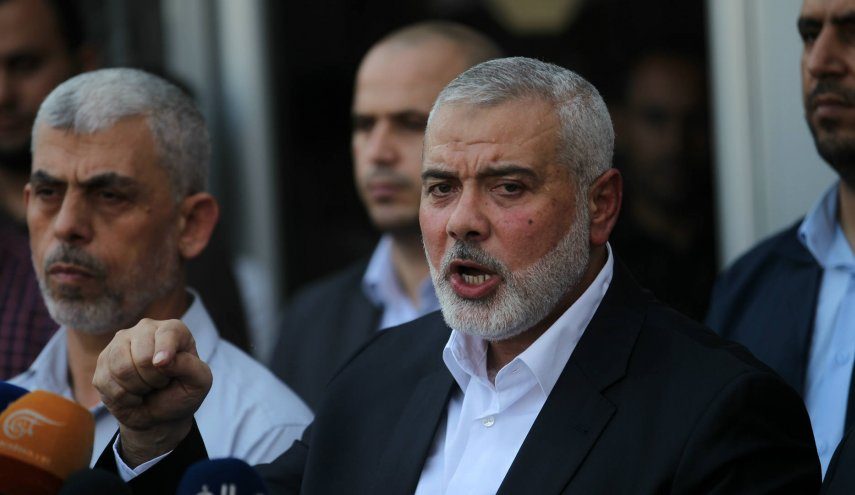
The Palestinian resistance group stressed that the captives’ release would come in exchange for “the release of Palestinian prisoners from the occupation prisons.”
Hamas is “close to reaching a truce agreement” with Israel after submitting its response on the deal to the Qatari mediators, the Palestinian group’s chief Ismail Haniyeh told Reuters in a statement on Tuesday.
“The movement delivered its response to the brothers in Qatar and the mediators, and we are close to reaching a truce agreement,” the statement said, without disclosing further details on the deal.
Haniyeh’s statement came hours after Ezzat El Risheq, a member of the Hamas’ political bureau, confirmed progress on the matter.
Speaking to Al Jazeera, El Risheq said that the agreement’s details would be revealed “in the coming hours”, noting that the information would only be announced by “the brothers in Qatar.”
“There was procrastination on the Israeli side to complete the armistice agreement, especially by [Israeli Prime Minister Benjamin] Netanyahu,” El Risheq told the Qatar-based broadcaster.
He added that the Israelis “are trying to negotiate in light of the aggression to break the resistance, and this has not and will not happen.”
Hamas’ statements come days after The Washington Post claimed negotiators had reached a tentative agreement on the release of captives. However, a source familiar with the matter confirmed to Doha News on Sunday that no deal has yet been reached.
National US Security Council Spokeswoman Adrienne Watson also denied the claims.
The reported arrangement included a five-day pause in fighting to enable the release of an initial batch of 50 or more captives in smaller groups every 24 hours.
The Gulf diplomatic broker has been at the forefront of talks aimed at mediating the release of civilian captives from Hamas that it had captured during the October 7 operation, known as the ‘Al-Aqsa Flood’.
At the time, the Al-Qassam Brigades – Hamas’ armed wing – infiltrated occupied territories for the first time through air, land and sea while returning home with around 242 captives, including members of the Israeli occupation forces (IOF).
Israel has since used the operation as a pretext for its most brutal war on Gaza in years, where more than 13,300 Palestinians, including more than 5,000 children, have been killed.
Qatar, the host of a Hamas political bureau, had mediated the release of four captives in October before negotiations stalled under the non-stop Israeli bombardment of the besieged Gaza Strip, though the latest statements by the Palestinian group have pointed to a potential breakthrough.
In his latest remarks to Al Jazeera, El Risheq noted that the release of captives would come in exchange for “the release of Palestinian prisoners from the occupation prisons”. He stressed that “if an agreement is announced, it will be acceptable and satisfactory” to Hamas and it will reflect their demands.
There are at least 2,070 administrative detainees and 200 child prisoners behind Israeli bars, per figures shared by Palestine’s Addameer Prisoner Support and Human Rights Association.
Administrative detention refers to those detained and kept in Israeli prisons without charge and access to legal defence.
Meanwhile, on Monday, Mirjana Spoljaric, president of the International Committee of the Red Cross (ICRC) met Haniyeh in Qatar to “advance humanitarian issues” related to the war in Gaza. The ICRC official noted that the meeting was not part of the captives’ release efforts.
The United States, Israel’s main ally, has been scrambling to secure the release of more captives from Hamas and has sent a number of its envoys to the region in hopes of breaking the negotiations’ apparent stalemate.
US President Joe Biden’s senior Middle East adviser Brett McGurk visited Qatar on Saturday as part of a regional tour, where he met the Gulf state’s Prime Minister and Minister of Foreign Affairs Sheikh Mohammed bin Abdulrahman Al-Thani.
A statement by Qatar’s foreign ministry at the time said the two sides discussed “developments in the Gaza Strip and the occupied Palestinian territories.”
“[Sheikh Mohammed] stressed the need for concerted regional and international diplomatic efforts to reach an immediate ceasefire and to permanently open the Rafah crossing to ensure the flow of relief convoys and humanitarian aid,” the statement said.
The Qatari official had also expressed his country’s “deep concern about the catastrophic deterioration of humanitarian conditions in the Strip”.
McGurk’s visit came days after CIA Director William Burns travelled to Doha on November 9 where he reportedly met with Qatar’s prime minister, Reuters reported at the time.
